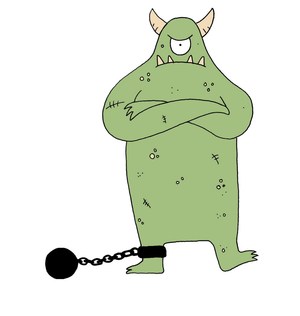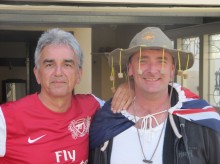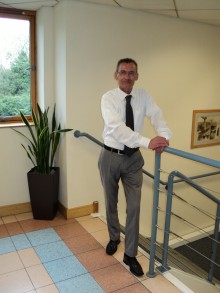Many of Marion’s study participants were thriving, living a successful life and doing far more than just surviving.
Support for You – One Woman’s Story
Louise C. runs a successful family business in Scotland that employs 90 people.
But she very nearly lost all of this, and her life, due to chronic alcoholism. Louise thanks her family for getting her into treatment. She remembers the day her family dropped her off at Castle Craig: “It took three men to drop me at the door of Castle Craig.”
She admits that “the best thing to do with alcoholics is to gang up on them and give them no option but to try treatment and face up to their addiction.” Once that is done, “you’re half-way there.”
‘A Personal Story’ by Kerrie
 This very moving Story was written for Wired In To Recovery in August 2011.
This very moving Story was written for Wired In To Recovery in August 2011.
‘Hi, my name is Kerrie. I am 37 years old. Both my parents died as a result of heroin addiction. My mum when I was 8 years old and she was 28, and my dad when I was 15 and he was 43.
I grew up in the madness of their addiction; needless to say we were a very dysfunctional family. I don’t remember my parents ever getting any real support. The only people involved with our family were the police and social services.
‘A Family Illness’ by Phil Hughes
 This excellent blog was written three years ago to the day on Wired In To Recovery.
This excellent blog was written three years ago to the day on Wired In To Recovery.
“I was like a tornado causing as much devastation as I possibly could in my family. But the problem was, I couldn’t even see it because all I cared about was me. I was caught up, obsessed with finding ways and means to get my next drink. When I didn’t have it, I was a nightmare to live with.
My mother felt so helpless, slowly watching her son kill himself through drink and drugs and not knowing whether she was coming or going half the time. It’s through that feeling of helplessness and frustration that the anger started to rear it’s ugly head.
‘What’s Next for the Truth?’ by Suzanne Beachy
Any diagnosis of mental illness results in a complicated and uncertain fate for those it strikes. When you lose a son as a result of such a diagnosis, it ignites a search for answers. Suzanne Beachy has gained a perspective on life as a result of her loss but is still asking, “What is the truth?”
Suzanne gave this talk at the TEDxColumbus event in 2010.
‘Addiction: Problems behind the problem’ by Recovery Coach
 I was pretending to be Superman when my mother’s frantic cries for help brought a sudden halt to my game. I ran towards the kitchen faster than a speeding bullet. But a Superman t-shirt with a bath towel tucked into the collar didn’t give me superhuman strength.
I was pretending to be Superman when my mother’s frantic cries for help brought a sudden halt to my game. I ran towards the kitchen faster than a speeding bullet. But a Superman t-shirt with a bath towel tucked into the collar didn’t give me superhuman strength.
Peering just below the vinyl seat of our yellow kitchen chairs, my eyes widened as Dad pinned my mother to the cold linoleum floor. He was a large man, standing 6’1″, and Mum was 4’6″. The image seemed surreal, like a horror movie, and I stood frozen in fear.
There was an odor of carnage as Dad hovered over her. Maybe it was the mixture of sweat and testosterone rising from his green work shirt. Pure, unfiltered terror flooded my body and my heart beat so fast it seemed to smash against my ribs.
Kevan’s Story (Short version): ‘He’s a loser and will never be any good’
 Here’s a short version of Kevan’s Recovery Story. Please feel free to circulate.
Here’s a short version of Kevan’s Recovery Story. Please feel free to circulate.
‘I developed a fascination for alcohol at an early age (nine), but didn’t realise that it would rule my life for over twenty years. I drank throughout my teenage years as if it was a normal thing to do, often with building site work mates or colleagues from my judo squad. Sadly, the promise I showed in judo was never realised because I shattered my right knee. Whilst I gave up the sport, I continued drinking.
My first wife and I separated because she didn’t like my drinking. After the divorce, I spent most of the money I made from the house sale on booze. Some guys at work said that I needed help for a drinking problem, but I told them to get stuffed with their job. I was doing what all men were entitled to do. I now spent most of my time in the pub.
‘Stigma’ by Peapod
 We all know that people with substance use problems and their families are stigmatised by many people. Here, Peapod blogs about stigma on Wired In To Recovery in 2009.
We all know that people with substance use problems and their families are stigmatised by many people. Here, Peapod blogs about stigma on Wired In To Recovery in 2009.
‘My dictionary defines stigma as “a mark of disgrace or infamy; a stain or reproach.”
It’s a problem for addicts like us. I’ve been subject to it a few times in both active addiction and in recovery. Recovery is such a good news story. Why do recovering addicts still suffer from stigma?
‘Never give up hope’ by Elizabeth Burton-Phillips
 Another of my favourite blogs from Wired In To Recovery, from December 2009.
Another of my favourite blogs from Wired In To Recovery, from December 2009.
“Like most grandparents, I can’t resist showing off pictures of my beautiful little grandson James, sitting with his adoring father Simon. But for me, the joy runs even more deeply than most, contrasting as it does with the devastation my family experienced almost six years ago.
At the age of 13, my son Simon and his twin brother Nick began experimenting with drugs by smoking cannabis. They sampled increasingly dangerous drugs over a period of 14 years, culminating in injecting heroin. One February day in 2004, after a huge drug-fuelled argument, Simon went to make peace with his brother and found that Nick had hanged himself.
‘Experiences of a mother of two young heroin addicts’ by Mark
 A very moving blog which first appeared on Wired In To Recovery (WITR) in May 2009. Mark blogged regularly on WITR until the community closed.
A very moving blog which first appeared on Wired In To Recovery (WITR) in May 2009. Mark blogged regularly on WITR until the community closed.
“We found my 20 year old brother dead of an overdose. He had just kicked the habit so tolerance was low. He started a job and the first payday was his last.
Mum wrote this after I got clean. Copy and use it anywhere it can be of use.”
‘What is it like being the mother of an addict? (Experiences of a mother of two young heroin addicts)
Must-read books: ‘Tweak’ and ‘Beautiful Boy’
 Five years ago I read two remarkable books by a father and son. There was only one way to describe these books – they were an emotional roller coaster. I read one straight after the other, hardly putting them down.
Five years ago I read two remarkable books by a father and son. There was only one way to describe these books – they were an emotional roller coaster. I read one straight after the other, hardly putting them down.
I was wrapped… and I was drained! I felt despair… and then hope. I learnt so much from these books. I cannot recommend them highly enough.
The two books were addiction Recovery Stories, written by Nic and David Scheff. Here’s what the back cover of Nic’s book Tweak had to say:
Impact of substance use problems on the family
 This piece of writing, which you can find in the Articles section, was based on a piece of research we conducted ten years ago. Hard to believe!
This piece of writing, which you can find in the Articles section, was based on a piece of research we conducted ten years ago. Hard to believe!
‘In November 2004, I wrote an article, entitled ‘Family Misfortune’, for the magazine Drink and Drugs News in the UK, that focused on the impact that substance use problems can have on the family. The article was based on a piece of research that Gemma Salter and I conducted with family members (primarily mothers) of people who were experiencing substance use problems.
‘My Recovery: A seminar opening speech’ by Adam
 Some of you in Perth will remember Adam Brookes. I met Adam a few years ago and he quickly became someone very important in my life, a really good friend. Adam is more than that, he is like part of my family. My children love him and my partner Linda feels very close to him.
Some of you in Perth will remember Adam Brookes. I met Adam a few years ago and he quickly became someone very important in my life, a really good friend. Adam is more than that, he is like part of my family. My children love him and my partner Linda feels very close to him.
I also saw that Adam had that something special, that empathic and caring nature that helps people get better. I knew that he was going to help many people.
Here is a 5-minute speech that Adam gave to open the Fresh Start Recovery Seminar in Perth in July 2011. He also blogged this on Wired In To Recovery.
Reflections on Kevan’s Story (Part 3)
 Hope you’ve been following Part 1 and Part 2 of my reflections on Kevan’s Story. I’ve been highlighting some of the processes occurring in Kevan’s recovery.
Hope you’ve been following Part 1 and Part 2 of my reflections on Kevan’s Story. I’ve been highlighting some of the processes occurring in Kevan’s recovery.
We’ve seen changes in his thinking and behaviours, and followed the lifestyle changes that Kevan made. We’ve seen how Kevan’s confidence in himself has grown over time and as the changes have occurred.
What is absolutely clear is that this recovery process was driven by Kevan. It was something he did, not something that was given to him by someone else. In fact, he spent many years in and out of a psychiatric hospital and no one suggested to him that he had a drinking problem. When he did meet with a drug and alcohol counsellor, the advice he was given was nonsensical!
Reflections on Kevan’s Story (Part 2)
 In yesterday’s blog, we looked at how Kevan’s thinking started to change in the early stages of his recovery after 25 years problematic drinking – and eight years in and out of psychiatric hospital.
In yesterday’s blog, we looked at how Kevan’s thinking started to change in the early stages of his recovery after 25 years problematic drinking – and eight years in and out of psychiatric hospital.
After a chance discussion with a vicar, he ‘realised’ that he was in mourning for his friend alcohol. He missed his friend so much, even though he knew he was much better off without it.
Most importantly, Kevan began to understand that he was responsible for his addiction to alcohol and was also responsible for overcoming his problem.
After nine months without drinking (and still on Antabuse), Kevan’s thinking was becoming clearer and he was coping with things easier. He was now developing a hatred for alcohol!
‘Intervention Keeley Style’ by William White
 Some Stories are just straight out funny! Whilst working my way through Bill White’s writings on his website, I came across this little gem he wrote in 2004 as part of his History Corner series. The article made me laugh, so I thought I would lighten your day.
Some Stories are just straight out funny! Whilst working my way through Bill White’s writings on his website, I came across this little gem he wrote in 2004 as part of his History Corner series. The article made me laugh, so I thought I would lighten your day.
‘The most famous and controversial treatment for addiction in the 19th century was Dr. Leslie Keeley’s Bichloride of Gold Cure. Dr. Keeley franchised his cure procedures through more than 120 Keeley Institutes scattered across North American and Europe. These Institutes became the preferred drying out institutions for the rich and famous in the 1890s.
But the problem then (as today) was this: Even where there are financial resources to pay for such treatment, how can the afflicted person be convinced to enter such a treatment institution?


